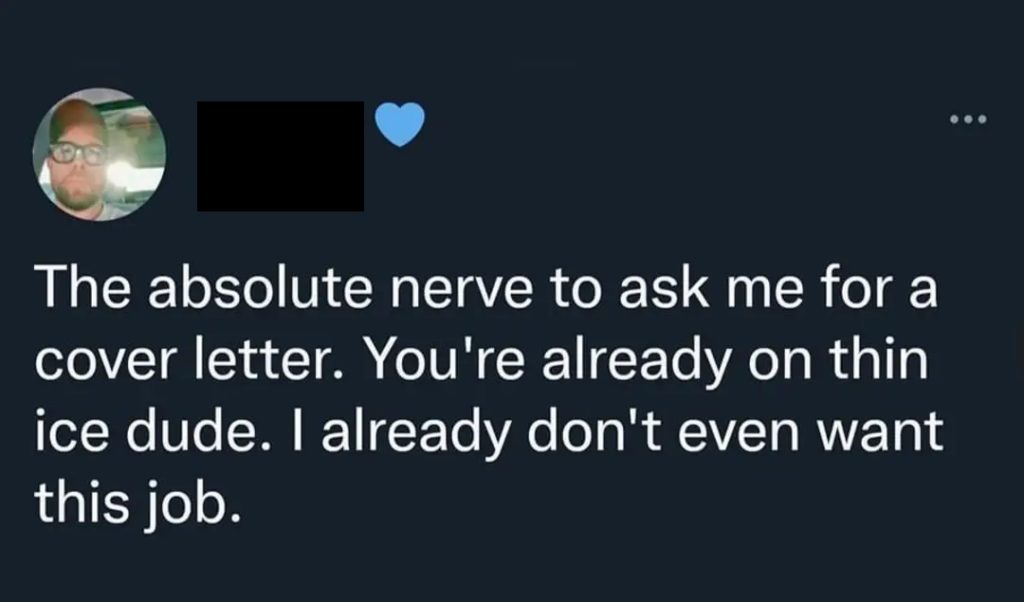Plan for Today
- Make sure you review last class’s webpage, especially “Résumé Duties”
- Show; don’t tell
- Interesting résumé format…(for further thought; I don’t expect you to do one like this)
Finish Résumé Stuff
Remember, you might have a résumé and cover letter that you used for a job (that you got), another class (that you got an ‘A’ on), or the career center. I will comment on your résumés and cover letters based on how effective you are about SHOWING that you’re the ideal candidate for a job. It’s not enough to just consider formatting concerns. You must also think critically about how you’re communicating your qualifications.
Head back to the discussion on workplace culture–last class’s webpage–if you need more guidance.
Also, even though this is supposed to be somewhat amusing, Peter Profit’s cover letter, while absurd, is formatted well and shows why he’s an ideal candidate. Notice that he doesn’t use phrases like “team player,” “goal oriented,” “punctual,” etc. He shows his experience and describes the tools he uses. That is showing and not telling. Show that you’re the ideal candidate in your cover letter.
Show; Don’t Tell
In case you need more clarification on show; don’t tell, I have more discussion of that. The following statements tell the audience what you do, but they really don’t show your duties.
- I am a team player.
- I am punctual.
- I am a self-started who gets the job done.
You might as well be claiming “I am good” or “I want this job.” None of those above sentences show you’re the ideal candidate for a position. They’re too generic and aren’t even good for introducing yourself. Notice that all the sentences use be verbs, which aren’t the most descriptive verbs available. Consider these revisions:
- As the simulation project manager for our 2019 release of League of Legends at Riot Games, I coordinated various development teams (programmers, directors, and actors) to ensure our release was on time and under budget.
I arrive to work promptly when required.I wake myself up and work without supervision on required tasks.
The 2nd and 3rd sentences above, while better than the originals because they use more descriptive verbs, are ridiculous statements. An organization expects you’ll be punctual and able to work without supervision. Mentioning those attributes raises red flags and would make a hiring manager ask, “why would they include such a statement?” Your insistence that you’re punctual and a self-starter makes readers think the opposite. After all, if you have to bring those up, you’re setting a low bar…
Cover Letter Value
I hear all the time that “jobs don’t ask for cover letter, so why are you making us write one?” Well, even though you might know of employment situations that don’t require cover letters, that doesn’t mean cover letters aren’t required for ANY job. Also, this assignment is a chance for you to articulate that you’re the ideal candidate for a job. You don’t have to apply to a “real” job. You can make it up. This exercise will be more beneficial for you if you aim for a job you’d like to do, but I’m not asking you to respond to a specific job ad.

The above meme may reflect your view of cover letters, but the exercise for this class is to practice choosing appropriate attributes for your audience–the employer. Yes, I, an English professor, will be the actually audience, and I will comment on whether or not you’ve done enough to show you’re the ideal candidate. Even if you never use a cover letter, having to express why you’re the ideal candidate is good practice.
Next Week
Keep up with the syllabus readings. You’ll have to have read Ch. 4 and 7 in Tebeaux and Dragga by Tuesday. We’ll also be starting our prose revision lessons, so find time to read this short piece on Revising Prose (pdf). This reading is also on Canvas. The goal of the lessons will be on understanding what is meant by “efficient prose” and “plain language.”
Your Weekly Discussion Post is due Thursday, 1/26, 11:00 pm.